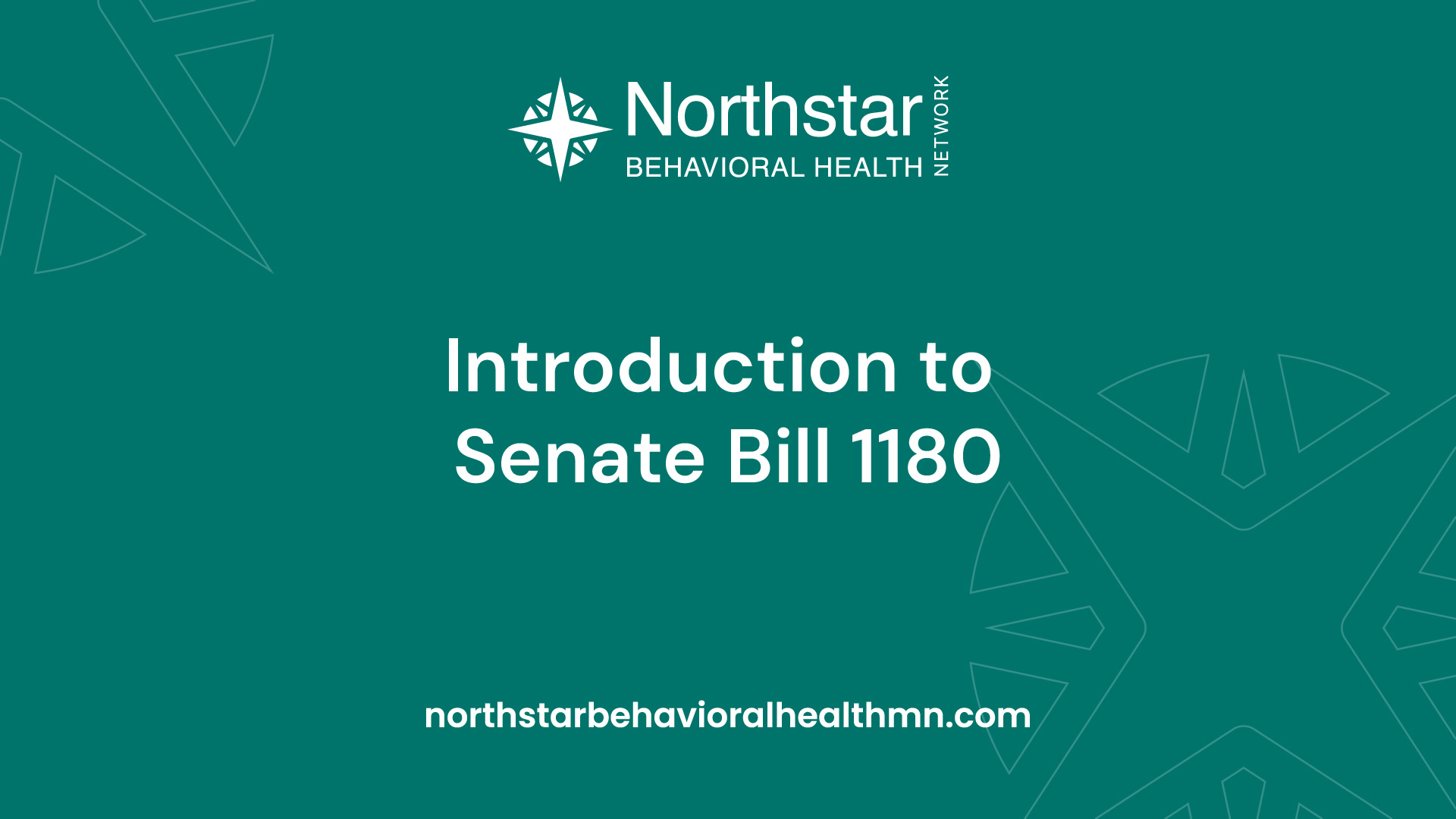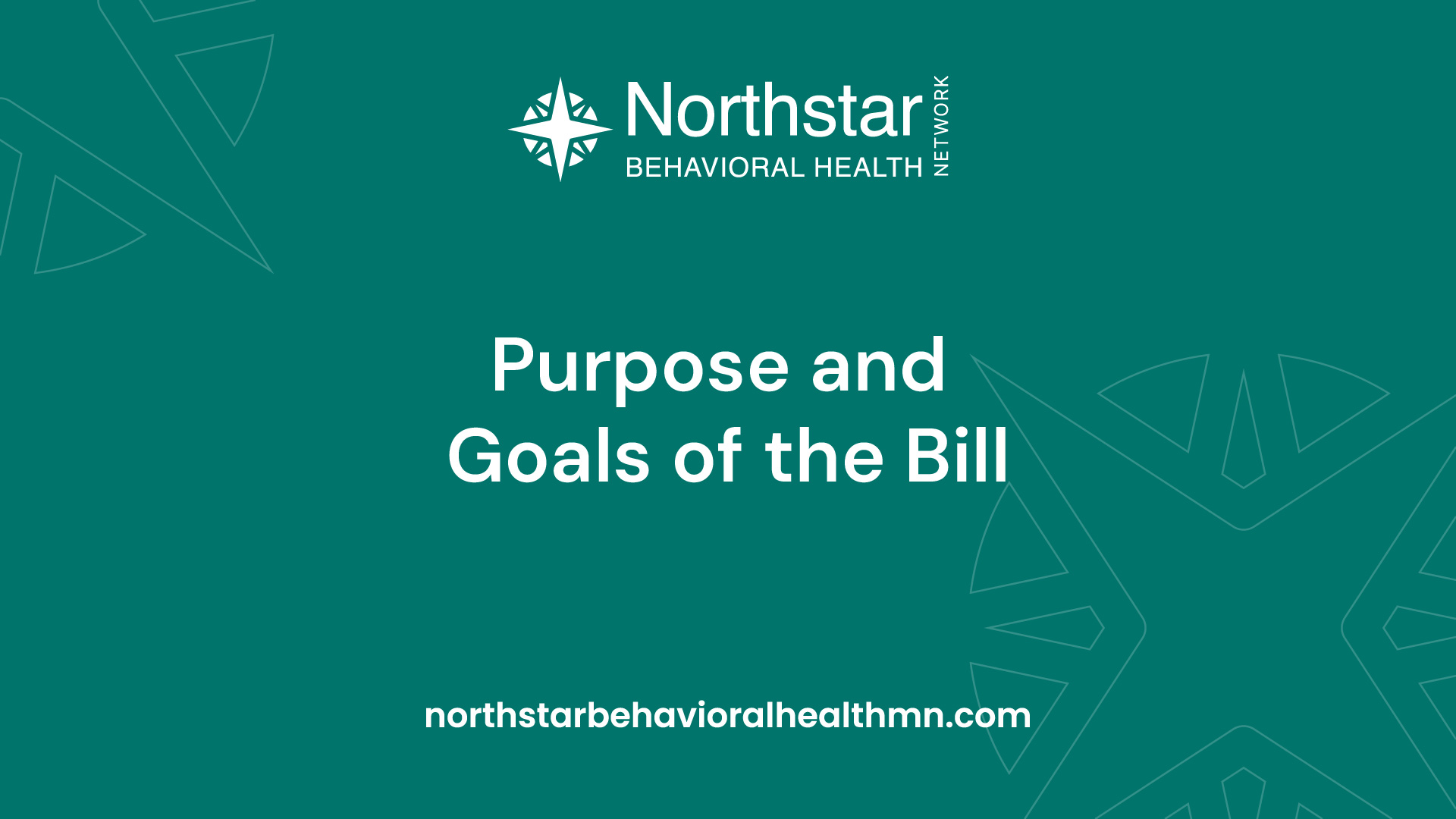August 4, 2024
Your Guide To Senate Bill 1180
Empowering change for addiction treatment and recovery.


Understanding Senate Bill 1180
Senate Bill 1180 is an important legislative proposal aimed at addressing the challenges posed by addiction and improving access to treatment and recovery services. This section provides an introduction to Senate Bill 1180 and highlights its purpose and goals.
Introduction to Senate Bill 1180

Senate Bill 1180, also known as the "Addiction Treatment and Recovery Act," is a comprehensive piece of legislation designed to tackle the ongoing crisis of addiction in our communities. The bill recognizes the urgent need to expand access to treatment, improve insurance coverage for addiction services, and support recovery communities.
Addiction affects individuals from all walks of life, regardless of age, gender, or socioeconomic background. Recognizing the severity of the issue, Senate Bill 1180 aims to provide comprehensive solutions to combat addiction and its devastating effects on individuals, families, and communities.
Purpose and Goals of the Bill

The primary purpose of Senate Bill 1180 is to expand and enhance addiction treatment and recovery services, making them more accessible and effective for individuals seeking help. The bill seeks to address the gaps in the current system, ensuring that those struggling with addiction have the necessary resources and support to overcome their challenges.
Some of the key goals of Senate Bill 1180 include:
- Expansion of Treatment Programs: The bill aims to increase the availability of evidence-based addiction treatment programs, including both outpatient and inpatient options. By expanding treatment capacity, more individuals will have the opportunity to receive the care they need to overcome addiction.
- Accessibility to Recovery Services: Senate Bill 1180 recognizes the importance of supporting individuals in their journey to recovery. The bill seeks to improve accessibility to recovery services, such as counseling, peer support, and other community resources. By strengthening these support networks, individuals will have a higher chance of maintaining long-term recovery.
- Changes in Insurance Policies: The bill addresses the need for improved insurance coverage for addiction treatment services. By advocating for changes in insurance policies, Senate Bill 1180 aims to ensure that individuals seeking treatment receive the necessary coverage and support, reducing financial barriers to accessing care.
- Benefits for Individuals Seeking Treatment: Senate Bill 1180 emphasizes the importance of providing comprehensive benefits for individuals seeking treatment. This includes coverage for medication-assisted treatment, counseling services, and other evidence-based approaches that have been proven effective in aiding recovery.
Senate Bill 1180 recognizes that addiction is a complex issue that requires a multi-faceted approach. By addressing the challenges faced by individuals seeking treatment and supporting recovery communities, this bill strives to empower change and create a brighter future for those affected by addiction.
As the bill progresses, it is important for individuals to stay informed and engaged. To learn more about how to access support services and get involved in advocacy efforts, continue reading our article on taking action. Together, we can work towards a society that supports and empowers individuals on their journey to recovery.
Impact on Addiction Treatment
The passing of Senate Bill 1180 has had a significant impact on addiction treatment, aiming to improve access to services and expand treatment programs. These changes are designed to address the growing need for effective addiction treatment options. Let's explore the key areas of impact in more detail.
Expansion of Treatment Programs
Senate Bill 1180 has led to the expansion of addiction treatment programs across the state. The bill allocates additional funding to support the development and implementation of new treatment centers and facilities. This expansion aims to address the increasing demand for treatment services and reduce wait times for individuals seeking help.
The increased availability of treatment programs means that more individuals struggling with addiction can access the care they need. This expansion includes a range of treatment options, such as outpatient programs, residential treatment centers, and detoxification facilities.
For individuals looking for specific treatment options, such as outpatient drug rehab that serves the LGBTQ population or accredited heroin rehab centers, there are resources available to guide them in finding the right program. Internal links to relevant articles, such as difficulty finding an outpatient drug rehab that serves the LGBTQ population? and finding accredited heroin rehab centers to help you get clean, can provide more information on these topics.
Accessibility to Recovery Services
Senate Bill 1180 aims to improve the accessibility of recovery services for individuals seeking treatment. The bill focuses on reducing barriers that may prevent individuals from accessing the care they need. This includes changes in insurance policies to ensure coverage for addiction treatment services.
Under the new legislation, insurance policies are required to provide coverage for addiction treatment, including both inpatient and outpatient services. This change ensures that individuals seeking treatment are not hindered by financial constraints. It is essential for those considering inpatient drug detox or other treatment options to understand their insurance coverage and explore available resources.
Internal links to relevant articles, such as what is inpatient drug detox? and economic effects of alcohol and drugs, can provide further guidance on these topics.
The improved accessibility to recovery services also includes benefits for individuals seeking treatment. The bill emphasizes the importance of providing comprehensive care, including mental health services and support for co-occurring disorders. This holistic approach aims to address the complex needs of individuals struggling with addiction, promoting long-term recovery and overall well-being.
Senate Bill 1180 represents a significant step forward in improving addiction treatment options and accessibility. By expanding treatment programs and ensuring coverage for recovery services, the bill aims to empower individuals to seek the help they need and embark on their journey to recovery. If you or someone you know is seeking addiction treatment, it's important to explore available support services and take the necessary steps to access them.
Internal links to articles such as welcome STR alumni of addiction treatment can provide guidance on accessing support services, while stomp the stigma fundraiser – saving lives one at a time and molly: what we can learn from the Wesleyan Twelve offer resources for advocacy and awareness.
Addressing Insurance Coverage
Senate Bill 1180 brings about significant changes in insurance policies, particularly in relation to coverage for addiction treatment. These changes aim to improve access to treatment services and provide better support for individuals seeking help.
Changes in Insurance Policies
One of the key provisions of Senate Bill 1180 is the requirement for insurance policies to provide comprehensive coverage for addiction treatment. Previously, some insurance policies had limited coverage or imposed high out-of-pocket costs for individuals seeking treatment for substance abuse. However, under the new legislation, insurance companies are mandated to offer adequate coverage for addiction treatment services.
The bill ensures that insurance policies cover a wide range of addiction treatment programs, including outpatient treatment, inpatient rehabilitation, detoxification, and medication-assisted treatment. This expanded coverage enables individuals to access the level of care that best suits their needs, without facing significant financial barriers. It is important to review your insurance policy or consult with your insurance provider to fully understand the coverage options available to you.
Benefits for Individuals Seeking Treatment
The changes in insurance policies mandated by Senate Bill 1180 bring several benefits for individuals seeking treatment for addiction. Firstly, the expanded coverage ensures that more individuals can access the necessary treatment services without worrying about financial constraints. This helps to remove one of the significant barriers that often prevent individuals from seeking help.
Additionally, the bill promotes parity between mental health and substance use disorder treatment coverage. Insurance policies are now required to provide equal coverage for addiction treatment as they do for other medical conditions. This ensures that individuals with substance use disorders receive the same level of support and access to treatment as those with other health conditions.
By addressing insurance coverage for addiction treatment, Senate Bill 1180 aims to make treatment services more accessible and affordable for individuals seeking help for substance abuse. If you or someone you know is struggling with addiction, it is important to understand your insurance coverage and take advantage of the benefits provided under the new legislation.
For more information on finding addiction treatment centers and resources, check out our articles on finding accredited heroin rehab centers to help you get clean and welcome STR alumni of addiction treatment.
Support for Recovery Communities
Senate Bill 1180 recognizes the importance of supporting recovery communities and strengthening peer support networks. These initiatives play a vital role in providing individuals with the resources and support they need to overcome addiction and maintain long-term recovery. In this section, we will explore how the bill aims to strengthen peer support networks and promote community resources and initiatives.
Strengthening Peer Support Networks
Peer support networks are an integral part of the recovery process. They provide individuals with a sense of community, understanding, and encouragement. Senate Bill 1180 aims to strengthen these networks by allocating resources to expand peer support programs and initiatives.
Through increased funding, these programs can offer a wider range of support services, including one-on-one mentoring, support groups, and educational workshops. By connecting individuals who have experienced similar challenges, peer support networks foster an environment of empathy and shared experiences, which can significantly enhance the recovery journey.
Expanding the reach of peer support networks allows individuals to access ongoing support even after formal treatment programs have ended. These networks provide a safe space for individuals to share their struggles, celebrate their successes, and build meaningful connections with others who understand their journey.
Community Resources and Initiatives
Senate Bill 1180 also acknowledges the importance of community resources and initiatives in supporting individuals on their path to recovery. The bill encourages the development and expansion of community-based programs that offer services tailored to the needs of those seeking recovery.
These community resources may include counseling services, educational workshops, employment support, and housing assistance. By making these resources more accessible, Senate Bill 1180 aims to remove barriers to recovery and create a supportive environment that promotes long-term wellness.
Community initiatives supported by the bill may include public awareness campaigns, educational events, and outreach programs. These initiatives aim to educate communities about the realities of addiction, reduce stigma, and encourage individuals to seek help when needed.
By investing in community resources and initiatives, Senate Bill 1180 fosters an environment where individuals feel empowered to take the necessary steps towards recovery. These resources provide the necessary tools and support to help individuals overcome addiction and build a healthier, more fulfilling life.
For more information on accessing support services and getting involved in advocacy efforts, refer to our articles on finding accredited heroin rehab centers to help you get clean and welcome STR alumni of addiction treatment. Together, we can create a community that supports and uplifts those on the path to recovery.
Advocacy and Awareness
Advocacy and raising awareness are vital components of Senate Bill 1180. By encouraging public engagement and educating communities on available resources, individuals can actively support the bill's goals and contribute to positive change.
Encouraging Public Engagement
Public engagement plays a crucial role in the success of Senate Bill 1180. It is essential for individuals to stay informed about the bill's provisions and understand how it can impact addiction treatment and recovery services. By actively participating in the process, individuals can voice their support for the bill and advocate for its implementation.
Here are a few ways to encourage public engagement:
- Attend town hall meetings and community forums to express your views and concerns.
- Engage with local organizations and advocacy groups that are working towards addiction treatment reform.
- Share information about Senate Bill 1180 on social media platforms to raise awareness among your friends, family, and community.
- Write letters or emails to your local representatives, urging them to support the bill and highlighting its importance in addressing addiction treatment.
By actively engaging in discussions, individuals can help create a supportive environment for Senate Bill 1180 and contribute to positive change.
Educating Communities on Resources
Education is a powerful tool in raising awareness and providing individuals with the necessary information to seek help or support others. By educating communities about available resources for addiction treatment, individuals can make informed decisions and access the assistance they need.
Some ways to educate communities on addiction treatment resources include:
- Organizing workshops or seminars in community centers, schools, or local organizations to share information on available treatment programs and services.
- Collaborating with healthcare professionals, counselors, and recovery support groups to provide accurate and up-to-date information on addiction treatment options.
- Creating informational materials such as brochures or pamphlets that outline local resources and distribute them within the community.
- Utilizing online platforms, such as community forums or websites, to share information about addiction treatment resources and support groups.
By educating communities on available resources, individuals can empower those struggling with addiction to seek help and connect with the appropriate support networks. For individuals seeking information on treatment options, our article on difficulty finding an outpatient drug rehab that serves the LGBTQ population? and finding accredited heroin rehab centers to help you get clean may provide additional guidance.
By actively advocating for Senate Bill 1180 and educating communities about available resources, individuals can contribute to the overall goal of improving addiction treatment and support services. The combined efforts of public engagement and education can help create a more supportive and understanding society for individuals struggling with addiction.
Taking Action
If you or someone you know is seeking support for addiction or wants to get involved in advocacy efforts, there are several steps you can take to access support services and make a difference. Here are two important avenues for taking action:
How to Access Support Services
Accessing support services is a crucial step towards recovery and navigating the challenges posed by addiction. Here's a guide to help you get started:
- Research available resources: Begin by researching the support services available in your area. There may be various organizations, treatment centers, and helplines that offer assistance and guidance. Online directories and government websites can provide valuable information on local resources.
- Contact helplines and hotlines: Reach out to helplines and hotlines specifically dedicated to addiction and recovery. These helplines are staffed with trained professionals who can provide immediate support, information, and guidance. They can assist you in finding the most appropriate services based on your specific needs.
- Seek professional help: Consider consulting with addiction specialists, therapists, or counselors who can provide personalized guidance and treatment options. They can help you navigate the various aspects of addiction and recovery, including treatment modalities, therapy options, and support groups.
- Join support groups: Support groups, such as Alcoholics Anonymous (AA) or Narcotics Anonymous (NA), can provide a sense of community, understanding, and shared experiences. These groups offer a safe space to connect with others who are going through similar challenges and can provide valuable support on your journey to recovery.
- Utilize online resources: In addition to in-person support services, there are numerous online resources available that can provide information, support, and virtual communities for individuals seeking help for addiction. Online forums, virtual support groups, and educational resources can be accessed from the comfort of your own home.
Remember, the path to recovery is unique for each individual, and it's important to find the support services that align with your specific needs and circumstances. For additional information on finding appropriate treatment options and support, be sure to explore related articles on our website, such as finding accredited heroin rehab centers to help you get clean or what is inpatient drug detox?.
Steps to Get Involved in Advocacy
Advocacy plays a vital role in raising awareness, influencing policy changes, and supporting individuals affected by addiction. If you're passionate about making a difference in the field of addiction and recovery, here are steps you can take to get involved in advocacy:
- Stay informed: Stay updated on the latest developments and news related to addiction treatment, recovery, and policies. Educate yourself about the challenges faced by individuals struggling with addiction and the barriers to accessing quality care. This knowledge will empower you to advocate more effectively.
- Join advocacy organizations: Research and connect with advocacy organizations that focus on addiction and recovery. These organizations often have local chapters or online communities where you can join forces with like-minded individuals and work towards common goals. They may offer resources, training, and opportunities to participate in advocacy campaigns.
- Contact legislators: Reach out to your local, state, or federal legislators to express your concerns and support for policy changes related to addiction treatment and recovery services. Attend community meetings, town halls, or legislative sessions to voice your opinions and share personal stories that highlight the importance of accessible and effective addiction treatment.
- Participate in awareness campaigns: Get involved in awareness campaigns and events that aim to educate the public about addiction, challenge stigma, and promote understanding. This could include participating in walks, fundraisers, or community forums that address addiction-related issues.
- Share your story: Share your personal experiences with addiction and recovery to raise awareness and inspire others. By sharing your story, you can help reduce stigma, provide hope, and encourage others to seek help. Consider writing articles, participating in interviews, or speaking at events to amplify your message.
Remember, advocacy is a collective effort, and your actions can contribute to positive change. To learn more about advocacy initiatives and events in your area, explore related articles on our website, such as stomp the stigma fundraiser – saving lives one at a time or narcan: helping to save lives in bucks county. Together, we can make a difference in the lives of those affected by addiction.

.jpg)




.jpg)

